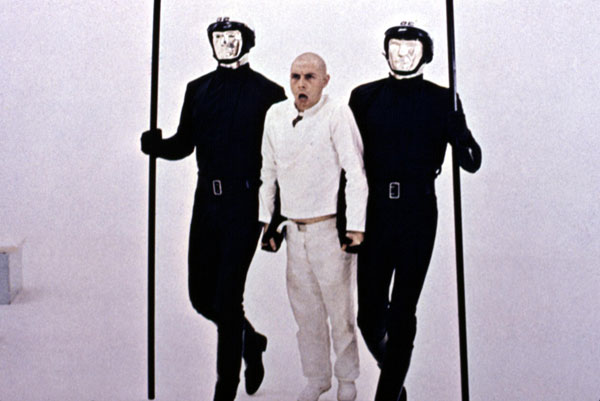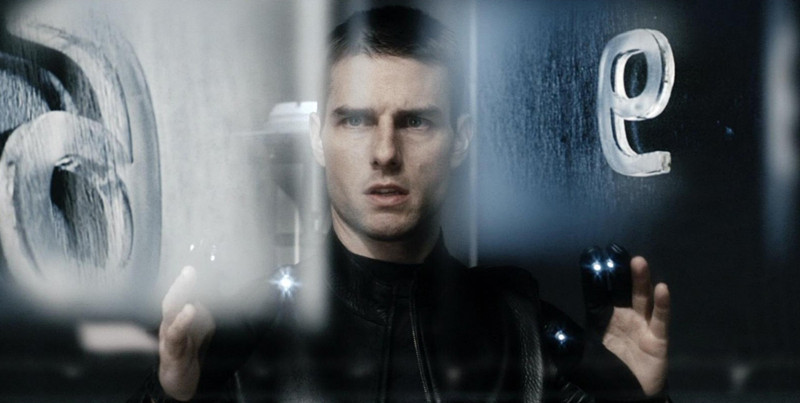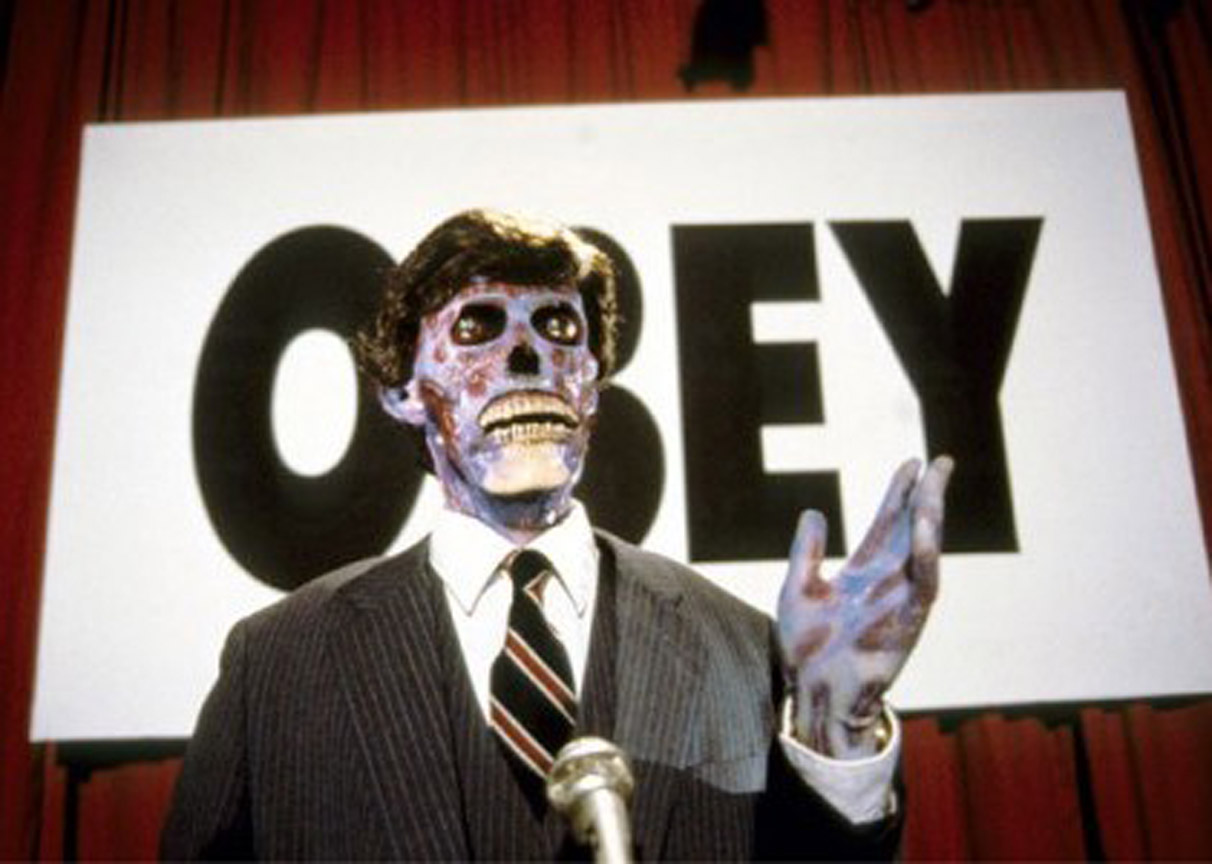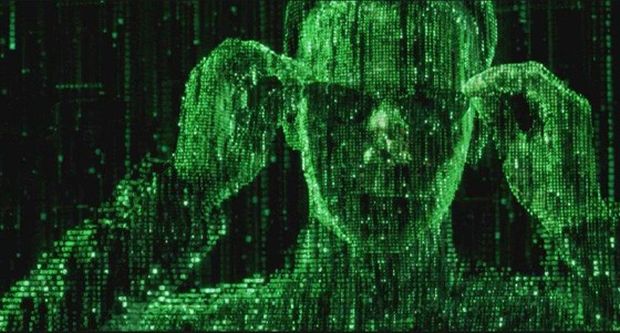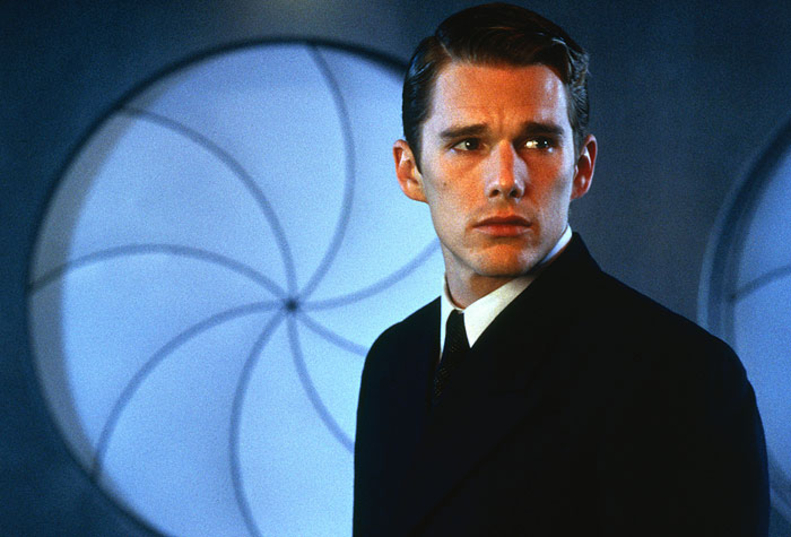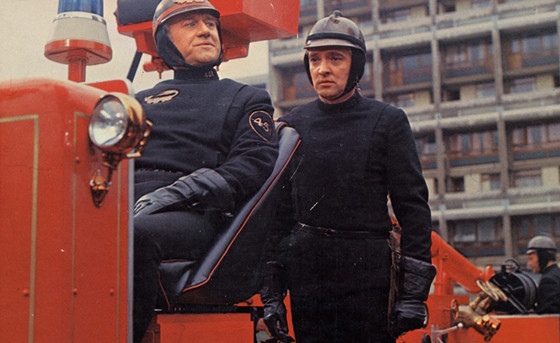14. THX1138 (George Lucas, 1971)
Before George Lucas delivered one of the most successful science fiction films of all time with Star Wars, he already had one very different type of sci-fi film under his belt. Expanded from his student film Electronic Labyrinth: THX 1138 4EB, THX 1138 was Lucas’ directorial feature film debut, a highly visual yet minimalistic take on a future dystopian society.
Set in a world which seems to solely consist of technology and the colour white and where everybody is drugged, walks around in the same white outfits with shaved heads and is forbidden to have sexual relations, the film follows THX 1138 (Robert Duvall) and his roommate LUH 3417 (Magie McOmie). LUH 3417 has started reducing their mandatory drug intake, causing both of them to start feeling true emotions for the first time.
As a result the two develop feelings for each other and have sex, causing LUH 3417 to fall pregnant. The two are caught, separated and imprisoned. After some time THX 1138 manages to escape with fellow prisoner SEN 5241(Donald Pleasence) and learns that LUH 3417 has been terminated and that her name has been reassigned to foetus 66691. Already distressed and completely disillusioned with the entire world around him, this discovery causes THX 1138 to try to find a way out of the underground structure the entire society consists of whilst he is being chased by the same robotic cops who he used to manufacture in his plant.
Striking with its minimalist and primarily white imagery, THX 1138 perfectly depicts its cold, dehumanised and paranoid world. Whilst the film wasn’t either a critical or financial success upon its initial release, it gained a steady cult following and was rediscovered when Lucas became a household name after the success of Star Wars.
And whilst the film’s deliberate pace and highly stylised imagery and set design are the most obvious features here, the final climactic car chase scene through the underground complex tunnel system already show some of the more flashy flair Lucas would later become famous for. A striking debut by a director who would never direct anything remotely like this again, THX 1138 is a true gem in his filmography and of seventies dystopian visions.
13. Minority Report (Steven Spielberg, 2002)
Based on the short story of the same name by Philip K. Dick, who was no stranger of dystopian visions, Minority Report is one of Steven Spielberg’s most successful post 2000 works and an action-packed noir-infused sci-fi thriller, set in a Washington D.C. where murder has mostly been ruled out.
Set in the year 2054, murder has virtually become a thing of the past in Washington D.C. as the “Precrime” police unit is able to prevent crimes before they even occur due to the use of three psychics Known as “precogs”, together they are infallible in their predictions of future crimes. John Anderton (Tom Cruise) is one of the detectives on the force but, when on the dawn of the system going nationwide, the precogs predict that he himself will murder a man who he doesn’t even know, he goes on the run being convinced that something is amiss.
When he learns that one of the precogs, Agatha (Samantha Morton), doesn’t always agree with the other two, thereby creating a “minority report”, he decides to kidnap her in an attempt to find out if he’s being set-up. And whilst it turns out that Agatha does have the same vision as the other two precogs in regards to the murder John is supposedly about the commit, he also learns that Agatha’s mother was killed and that his knowledge of the case might be related to why he finds himself in his current situation. Meanwhile Danny Witwer (Colin Farrell), who has been hunting John down, also starts to realise that things aren’t all what they seem when he finds out some of the precog’s visions have been tampered with.
As is to be expected, this Spielberg interpretation of a Philip K. Dick story focuses more on the action elements than the dystopian ones but that doesn’t mean that this film is any less successful. With a stunning visual style, both in production design and in photography, having shot the film in desaturated high contrast, Minority Report is an intricately scripted and edge-of -your-seat sci-fi thrill ride.
Most of the film’s depicted technology was also given considerable scientific thought and some of what’s on display, which didn’t really exist at the time of production, has actually become reality by now. Perfectly balancing intricate storyline and serious themes of determinism vs. free will and the dangers of preventive crime measures by government with action-packed spectacle, Minority Report is a highly entertaining dystopian film and not as bleak as many other entries on this list. The film was nominated for eleven Saturn Awards, winning four of them for Best Science Fiction Film, Director, Writing and Supporting Actress for Samantha Morton.
12. They Live (John Carpenter, 1988)
Definitely a dystopian film, although one might need sunglasses to see it, They Live is a satirical science fiction/horror hybrid directed by John Carpenter, who after a few failures at the box-office and heightened studio interference had signed a contract with Carolco, which allowed him greater creative freedom in exchange for working with smaller budgets. The first result of this contract was They Live.
John Nada (Roddy Piper) is an unemployed drifter who finds construction work in Los Angeles and befriends Frank Armitage (Keith David). Frank takes him to a shanty town where John takes up residence as he stubbles across some strange going ons in the local church. When the church is raided by police one night, John finds a box of sunglasses in the wreckage, which he hides after taking one for himself.
Soon he finds out that the sunglasses are far from normal and that wearing them allows a person to see the world as it really is: dominated by aliens and full of subliminal messages through advertising to ensure mankind sticks to consuming and obeying whilst small surveillance drones monitor everybody’s movements on the streets.
He goes back to get the rest of the sunglasses and convinces Frank, after a lengthy fist-fight, to wear a pair too. The two men then join the resistance where they learn that the aliens use a special broadcast to hypnotise people into not seeing the truth around them and that stopping the broadcast is the only way for the world to wake up.
There’s a lot to like in They Live and Carpenter manages to squeeze everything from his limited budget. The central concept of the sunglasses, which allow one to see the world as it really is, black and white and filled with propaganda through advertising and commercialism in a seemingly free society, is simply great and the film also features one of the best fight scenes ever put on film as Roddy Piper and Keith David lay into each other for more than five minutes.
The film combines sci-fi and horror elements with biting satire and action and the film also sports a classic one-liner about chewing gum and kicking ass. As long as you don’t let the budget restrictions or Piper’s dubious acting put you off, this is one hell of a B-Movie.
11. The Matrix (The Wachowski Brothers, 1999)
Whilst not their first feature film, there is no doubt that The Matrix was the movie that put the Wachowski Brothers on the map in a big way, and they have been struggling to make anything half as impressive ever since.
Thomas Anderson (Keanu Reeves), who goes by the hacker-alias Neo, is a regular guy working in a cubicle whilst doing some hacking in his spare time. One day he is contacted by what is seemingly another hacker, Trinity (Carrie-Anne Moss), who tells him that Morpheus (Laurence Fishburn) will be able to reveal the truth about “The Matrix”, a term Neo has been encountering repeatedly online.
When meeting Morpheus, Neo is given a choice of taking one of two ; if he takes the blue pill, all will go on as it did before and he will forget about their meeting but if he takes the red pill, Neo will learn the truth and nothing will ever be the same again. Neo chooses the red pill and wakes up in the real world, a futuristic dystopian nightmare where machines have taken over the world, enslaved nearly everybody and created a massive artificial intelligence illusion (the world Neo knew before taking the red pill and always assumed to be real).
They do so by keeping mankind asleep and using their bodies to produce energy. But Morpheus and his small group of resistance fighters, who live outside of the Matrix, think Neo might be the prophesied “One”, who will be able to break the Matrix and restore freedom for mankind. Meanwhile agent Smith (Hugo Weaving), a sentient “agent” program designed by the machines to hunt people outside of the Matrix down, is trying to stop Neo from ever fulfilling his destiny.
The Matrix was the Wachowski Brothers’ love letter to anime, science fiction and actioned-packed Hong Kong cinema and was a success on every level. The script combines an intricate storyline with mindblowing set pieces and the film will forever be associated with “bullet time”-effects, where the camera moves at regular speed through scenes taking place in extreme slow-motion.
The art direction and design also stand out as the Wachowski’s managed to create a totally believable yet utterly fantastic world and the film also popularised the use wire-fu and intricate kung-fu choreography into the Western mainstream. The film won four Academy Awards (Best Editing, Sound, Sound Effects and Special Effects) as well as Best Science Fiction Film and Best Director from the Academy of Science Fiction, Fantasy and Horror Films. A landmark blockbuster, which spawned two extremely disappointing sequels despite the fact that their technical aspects were nothing to sneeze at either.
10. Gattaca (Andrew Niccol, 1997)
Gattaca, a title comprised on the first letters of guanine, adenine, thymine and cytosine, which are the four nucleobases of DNA, is a 1997 science fiction drama, which was the directorial debut of New Zealand screenwriter Andrew Niccol, who also wrote the screenplay.
Set in a dystopian future society where one’s lot in life is determined by one’s genetics instead of one’s education or talents, the world has been clearly divided in the haves, those able to afford the genetic manipulation of their offspring and who are referred to as “valids”, and the have nots, the rest of the population who cannot so and are called “in-valids”. Vincent (Ethan Hawke) is an in-valid and is therefore excluded from the Gattaca space program, his greatest dream in life.
He consequently seeks the help of a DNA broker German (Tony Shalhoub) and manages to make a deal with Jerome (Jude Law), a valid who has been partially paralysed in an accident and willing to sell Vincent various of his DNA samples, needed to forge his genetic identity. By doing so, Vincent enters the space program and everything goes according to plan until one week before his departure into a space, a mission director is murdered, causing a widespread search for the killer amongst all involved in the program.
An intelligent, cool and ultra-stylish exploration about the ethics surrounding genetic manipulation and science, Gattaca is filled with social commentary and a stunningly designed and shot piece of psychological science fiction. The film also features Uma Thurman as Vincent’s love interest and an impressive supporting cast, which includes Ernest Borgnine,
Alan Arkin, Elias Koteas and Gore Vidal. Also of note is the movie’s soundtrack, composed by Michael Nyman, which adds greatly to film’s mood. Whilst not a great financial success, the film earned plenty of critical praise and Gattaca received an Academy Award nomination for Best Art Direction-Set Decoration as well as winning Best Film and Soundtrack awards at the Stiges Film Festival.
9. Brazil (Terry Gilliam, 1985)
Perhaps best described as a dystopian satire, heavily borrowing elements from Orwell, Kafka as well as Huxley, Brazil was the ambitious follow-up to Gilliam’s Time Bandits and the film that firmly put him on the map as a director, after having starred his career as part of the Monty Python troupe.
Sam Lowry (Jonathan Pryce) is a civil servant in a future society, which has become a nightmare of bureaucracy, automatization and totalitarianism. To escape this horrible world, Sam often day dreams about being a hero and saving the girl of his dreams in far more appealing worlds. When one day he is called to investigate the incidental death of an innocent citizen during an interrogation, who was mistaken for a terrorist, he is astonished to find out that the man’s widow Jill (Kim Greist) looks exactly like the girl from his dreams.
Through his association with the woman, he actually gets in contact with the terrorist the government was after in the first place, Archibald Tuttle (Robert DeNiro). Through him and his infatuation for Jill, Sam slowly gets sucked into the resistance and is consequently arrested and interrogated by his old friend Jack Lint (Michael Palin).
A visually inventive satire, Brazil can easily be imagined as 1984 on drugs with a good measure of humour thrown in. As per usual with Gilliam films, the movie is bursting at the seams as every possible idea he had seems to have been thrown in and can be hard to follow as a result, especially as it’s also quite a visually overwhelming piece of work.
The film was Gilliam’s real breakthrough as a director although it only became a success in Europe at the time of its release, whilst it was largely ignored in the United States, where it has become a cult classic since. Apart from those mentioned above, the film has a fantastic supporting cast which includes Ian Holm, Jim Broadbent, Bob Hoskins and Katherine Helmond.
Brazil was nominated for two Academy Awards (Best Original Screenplay and Art Direction), won two BAFTA Awards (Best Production Design and Special Effects) and also managed to win Best Film, Director and Screenplay at the Los Angeles Film Critics Association Awards.
8. Fahrenheit 451 (Francois Truffaut, 1966)
Based on the novel of the same name by Ray Bradbury, Fahrenheit 451 is a dystopian science fiction film, which would turn out to be the only American film adapted for the screen and directed by François Truffaut, starring Oskar Werner and Julie Christie.
Some time in the future, the government has placed a ban on all books in order to control public opinion and the profession of fireman now consists of enforcing the law by burning every illegal book that is found. In this world, we follow Montag (Werner), a fireman married to a woman (Christie) completely indoctrinated by the state’s views, who has started to doubt the system as well as his job.
Montag has also started to fall in love with an unorthodox young girl who has moved in next door, Clarisse (Christie in a dual role), who turns out to be part of the underground resistance. This causes Montag to doubt his role even further and he starts stealing books whilst on the job and hiding them in his home. But when Clarisse’s house is raided and Montag is informed upon by his wife for his possession of books, the only thing left to do is try to escape to the so called “book people”.
Fahrenheit 451 has a terrifying and fantastic central premise and one that seems to become more relevant with the passing of each year. The film is a strange mixture of a very normal boring looking world and a highly stylised one with some very unique production design features. Shot in washed out colours by future director Nicholas Roeg, the film looks quite unlike anything else and it lacks any written word, as even the opening credits are spoken.
The performances also seem muted, enforcing the film’s theme of a population which is being kept “asleep” by a constant barrage of mindless entertainment and propaganda whilst Julie Christie’s dual role clarifies Montag’s struggle between his old life and his doubts. And the film’s finale, in which Montag escapes the city and makes his way to the alternate society of “book people” in the woods, is as powerful as ever.
A truly unique piece of work, Fahrenheit 451 is an insightful and underrated dystopian nightmare, which, whilst being distancing, is also extremely powerful. The film was nominated for the Golden Lion at the Venice Film Festival.
